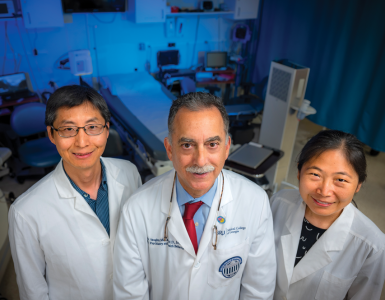To better prepare medical students at the Medical College of Georgia to work with adolescent patients, April Hartman, MD, division chief of General Pediatrics and Adolescent Medicine developed the Pediatric Pathways Program that combines Augusta University theater students and local middle and high school students in a unique collaboration to help address pediatric health concerns.
For two weeks this past summer, Hartman, along with Melanie Kitchens O’Meara, PhD, an associate professor of performance studies in the AU Department of Art worked with area middle and high school students to teach them dramatic acting skills to become pediatric standardized patients for mock appointments with medical students.
Hartman says medical students often have the opportunity to work with adult standardized patients, but interaction with pediatric standardized patients isn’t as common.
“The Augusta University students and middle school students are partnered as a parent and child. They create like a family unit,” O’Meara said. “We wanted to create a family dynamic so the medical students could practice how they talk to and ask questions to patients who are this age.”
“They are learning about what types of questions doctors have to ask and why,” Hartman says. “During the simulation, the complaint for each of the families is that the child is having problems in school, and that’s why they are going to the doctor. So, they are all starting at the same place and then they have to create a story around that.”
Medical students were also faced with a variety of scenarios including the teens suffering from depression, eating disorders, anxiety and drug use.
Whenever a physician walks into a room with a patient and their family, it is important that the doctor is prepared to handle any scenario in a professional and productive manner, Hartman says.
“Sometimes there is mom, there’s dad, there’s grandma, there’s a brother and they all have an opinion about what’s happening with that child,” Hartman says. “Sometimes it will feel awkward and uncomfortable. You just have to be OK with that. And this comes with time and practice, which is why we are doing this. It’s a process so that you can practice building a relationship with your patient.”










